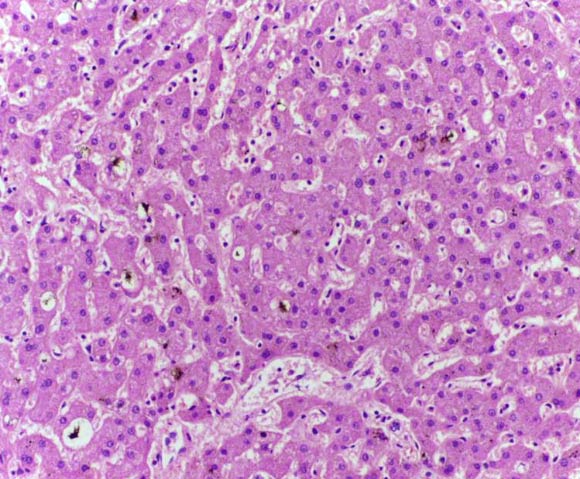A research team led by Dr. Christopher Adin from College of Veterinary Medicine at North Carolina State University has found that doses of bilirubin, a normal by-product of the breakdown of old red blood cells, help provide suppression of the immune response following islet transplantation in mouse models.

Liver showing accumulation of bilirubin pigment. Image credit: Department of Pathology, Calicut Medical College / CC BY-SA 4.0.
Bilirubin also significantly decreased islet cell death after the cells had been isolated and undergone nutrient deprivation and hypoxic (low oxygen) stress, according to the team.
If applied, the results of the study are expected to improve outcomes after allograft islet cell transplantation to treat type 1 diabetes.
“Pancreatic islet transplantation has the potential to provide a potentially curative, non-invasive treatment for type 1 diabetes. However, stress and injury can cause up to a 70% loss of cells in the first 72 hours after transplantation,” Dr. Adin said.
“We hypothesized that bilirubin, an antioxidant, could be used as a supplement to suppress the immune response to allograft islet transplantation.”
“In this study with mice, we administered bilirubin to the pancreas before procurement or added it to a culture after islet isolation.”
Bilirubin, a cytoprotectant, has been shown to improve outcomes in cases of sepsis and in solid organ transplantation.
The current study, however, is the first to investigate bilirubin as an islet allograft protectant from the immune response and other cell death-causing injury.
Dr. Adin and co-authors found that bilirubin supplementation could suppress the damage caused by the release of ‘damage-associated molecular patterns’ (DAMPs) that included types of foreign cell-fighting immune cells.
Their studies also revealed that bilirubin also has a direct effect on the phenotype – the physical appearance – of the antigen cells that fight against engraftment, especially macrophages, a type of cell that engulfs and digests cellular debris and foreign substances.
“Taken together, that bilirubin can suppress DAMP release, alter cytokine profiles, and affect macrophages, suggests that the use of this natural antioxidant may provide a method for pre-conditioning to improve outcomes after islet allograft transplantation,” the scientists said.
“With the increasing age of the population, diabetes will increase in prevalence and the demand for new treatment paradigms will become more pressing,” said Dr. Camillo Ricordi, Diabetes Research Institute, University of Miami, who was not involved in the current study.
“Use of an anti-oxidant compound to combat immune rejection could be an effective method for overcoming obstacles to the advancement of cell therapy for diabetes.”
The team’s findings were published online July 7 in the journal Cell Transplantation.
_____
Christopher A. Adin et al. Physiologic doses of bilirubin contribute to tolerance of islet transplants by suppressing the innate immune response. Cell Transplantation, published online July 7, 2016; doi: 10.3727/096368916X692096







